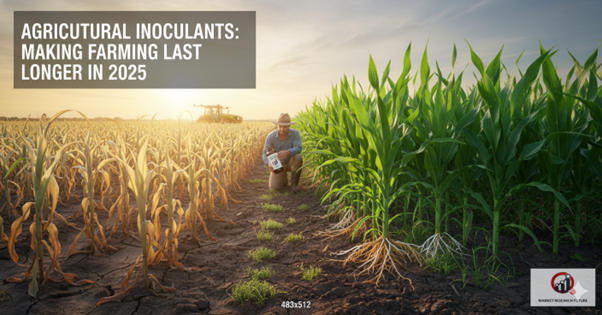Agricultural Inoculants: Making Farming Last Longer in 2025

Trends and Future of Global Agricultural Inoculants
Agricultural inoculants are helpful microorganisms that are put on seeds or soil to make plants grow better, stay healthy, and produce more. These inoculants are made up of bacteria, fungi, and other microbes that stop diseases, help plants take in nutrients, and increase crop yields. There are many different types of them, including solid, liquid, and freeze-dried. New technologies are always making them more stable and useful.
The market for agricultural inoculants has changed a lot because more people are interested in organic food production, sustainable farming practices, and getting the most out of crops while using fewer chemical fertilizers.
Growing Demand for Organic Farming
The growing global demand for organic foods has led to the use of agricultural inoculants. Farmers and scientists are working hard to find the best microbial formulations that will help plants grow faster and better. Inoculants make crops stronger, help them use nutrients more efficiently, and increase their overall yield while having less of an effect on the environment.
They can be used in farming and gardening to help make farming systems more sustainable and soils healthier. Because more people are using organic and regenerative methods, agricultural inoculants are now an important part of modern farming strategies.
Government Programs that help the Market Grow
Governments all over the world are doing a lot to encourage the use of inoculants. A number of countries are encouraging farmers to use microbial solutions to manage their soil and crops by giving them money, running awareness campaigns, and supporting regulations. These programs are helping to get more people to use them and make it easier to study new, high-performing strains of microbes.
North America and other regions are still the leaders in the market because they have strong research infrastructure, focus on sustainable agriculture, and farmers are becoming more aware of how to deal with climate change. People are more interested in inoculants as a long-term solution because of worries about the environment, like soil degradation, changing rainfall patterns, and extreme weather events.
Opportunities in Latin America
Latin America is a great place to sell agricultural inoculants. Microbial solutions are a great fit for this area because it has a wide range of farming systems, from smallholder farms to large-scale commercial farms. Inoculants help major crops like soybeans, corn, and coffee by increasing both the yield and the health of the soil.
Even though the natural conditions are good, some countries have problems because of limited government subsidies and complicated rules. Still, the area is an important part of the world's agricultural output, and new microbial technologies can boost productivity while encouraging eco-friendly farming methods.
Seed Inoculants: The Market Leader
Seed inoculation has become one of the most important factors in the agricultural inoculants market. This process coats seeds with nitrogen-fixing bacteria that enter plant roots and form nodules. These nodules change nitrogen in the air into forms that crops can use. This relationship is especially good for legumes like soybeans, beans, and clover.
Inoculating seeds not only helps crops grow better, but it also helps beneficial microbes survive by protecting them from toxins in the soil and stresses in the environment. Adding systemic fungicides during inoculation protects seedlings from root diseases even more, which leads to higher germination rates and healthier crops. This method cuts down on the number of seeds needed and helps farms run more smoothly.
Important Uses for Crops
Oilseeds and pulses are still some of the most important crops that benefit from agricultural inoculants. Pulses are very important for human nutrition and for crop rotations that are good for the environment. They are high in protein, fiber, vitamins, and minerals. Using inoculants on these crops increases their yield, makes them less dependent on synthetic fertilizers, and makes the soil healthier.
The market is also growing because farmers are looking for ways to boost productivity and quality while having the least impact on the environment. This is happening because more uses are being found for fruits, vegetables, and horticultural crops.
The Future of Agricultural Inoculants
Agricultural inoculants are becoming more and more important for sustainable farming, especially in developing areas where using resources wisely is very important. The market's future depends on teaching farmers about the benefits of inoculants, showing them how they work, and including them in overall plans for soil health and crop management.
Companies in the industrial sector are putting a lot of money into research and working with farmers to create models of sustainable agriculture that work together. These projects aim to boost yields, improve soil fertility, and provide long-term social and economic benefits for rural communities by combining cutting-edge farming methods with new microbial solutions.
The Rules and Regulations
Rules for agricultural inoculants differ a lot from one area to the next. Some countries have clear rules for getting approval and registering products before they go on the market, while others let people access the market freely with little supervision. To make sure that inoculants and agronomic additives are always of the same quality and can be safely used, it is important to standardize them and give clear definitions.
Brazil and Hungary have made it mandatory to register under fertilizer laws, while other areas are still working on how to regulate fertilizers. Making policies simpler and giving advice can speed up adoption and help agriculture grow in a way that is good for the planet.
Agricultural inoculants are a major breakthrough in modern farming because they help farmers be more productive, environmentally friendly, and sustainable at the same time. Inoculants are going to change farming practices all over the world, making crops healthier, yields higher, and the future greener for 2025 and beyond. This is because of more research, supportive policies, and more people knowing about them.